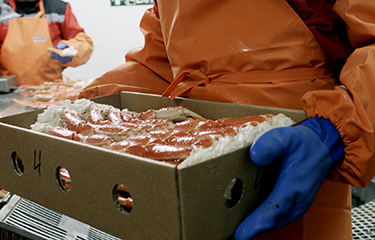Japan’s imports of fish and fish preparations from Russia in 2022 rose to a new record value of JPY 155.2 billion (USD 1.14 billion, EUR 1.05 billion), up 12.9 percent from 2021, frustrating other nations, especially Canada, that have vowed to heavily limit or totally ban imports from the country following its invasion of Ukraine in February 2022.
The previous record high value of seafood imports from Russia to Japan occurred in 2018, when Japan imported JPY 140.2 billion (USD 1.03 billion, EUR 950 million) worth of seafood. Imports by volume reached 124,437 metric tons that year, a 13.8 percent increase from 2017.
Japan's 2022 imports from Russia included 11,073 MT of snow crab, valued at JPY 32.6 billion (USD 240.1 million, EUR 221.3 million). Japan also imported nearly 21,000 MT of pollock eggs, the material for the Japanese foods “mentaiko” (spicy cod roe) and “tarako” (salted cod roe), valued at JPY 22.3 billion (USD 164.28 million, EUR 151.3 million). Other products with significant volumes included sockeye salmon, king crab, and sea urchin.
U.S. President Joe Biden ordered a ban on Russian seafood on 11 March, 2022, and it took effect on 25 March. Although a reduction in imports of Russian crab – along with a collapse of snow crab numbers in areas of Alaska – would seem to create a big opportunity for Canada, inflation has dampened American appetite for luxury foods. Canada’s exports of snow crab to the U.S. rose only 7 percent in the first three months of 2023.
With the U.S. ban on crab from Russia, Japan and South Korea promptly took advantage of Russian product suddenly available at low prices, leaving many distributors with stockpiles higher-priced inventory.
While Japan has implemented numerous political measures against Russia and Belarus, it has received the Biden adminitration's blessing to continue imports of natural gas and seafood from Russia due to its lack of domestic fuel sources and heavy dependence on seafood imports.
In March 2022, Japan, following actions taken by other G7 nations, removed Russia’s “most-favored nation” (MFN) status, thus subjecting it to higher tariffs. However, the increases were not major. The duty on crab went from 4 percent to 6 percent, and the duty on salmon and trout rose from 3.5 percent to 5 percent.
Politicians in Canada’s Maritime provinces are now urging Japan to instead buy Canadian snow crab, with plummeting prices prices meaning ...
Photo courtesy of Russian Crab Company








